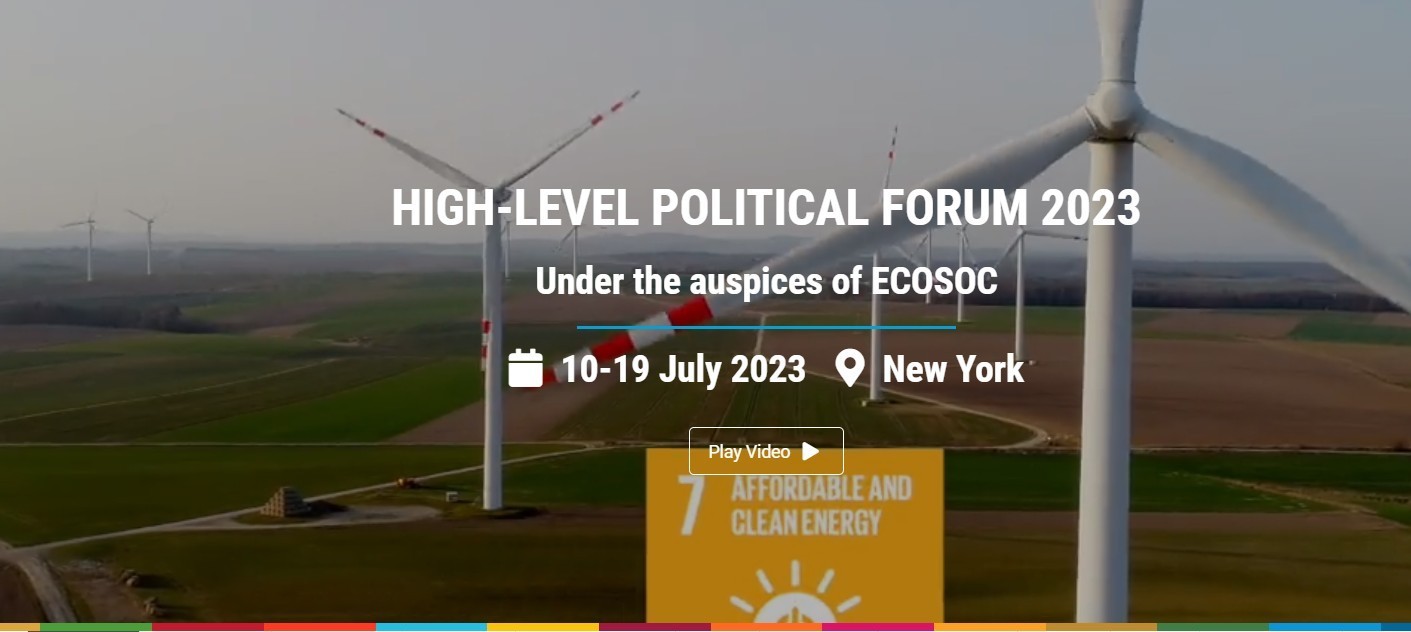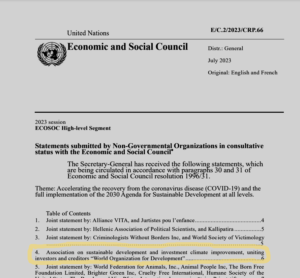OFFICIAL STATEMENT
On 10/07/2023, NGO Branch United Nations informed you that following an open call for applications, the written statement of the Association on sustainable development and investment climate improvement, uniting investors and creditors “World Organization for Development” for the High Level Segment 2023 has been published.
The written statement can be found at the following links:
1) 2023 ECOSOC High-level Segment: https://www.un.org/ecosoc/en/events/2023/high-level-segment-council-including-three-day-ministerial-segment-high-level-political under ‘Other relevant links’ on the 2023 ECOSOC High-level Segment website at: https://www.un.org/ecosoc/sites/www.un.org.ecosoc/files/documents/2023/2023-hls-compilation-of-written-statements-ngo_6jul23.pdf 2) 2023 High-level Political Forum: https://hlpf.un.org/2023/stakeholders under ‘Latest’ section: https://www.un.org/ecosoc/sites/www.un.org.ecosoc/files/documents/2023/2023-hls-compilation-of-written-statements-ngo_6jul23.pdf
NGO Branch United Nations thanked the Association on sustainable development and investment climate improvement, uniting investors and creditors “World Organization for Development” for participating in the open call for applications and hoped that World Organization for Development would continue to contribute to the ECOSOC High-Level Segment in the future. The next ECOSOC High-Level Segment will be announced on the UN website in March 2024. ![]()


World Organization for Development (WOD) is an international non-governmental organization in special consultative status with UN ECOSOC (since 2014) and a member of the UN Global Compact (since 2016). It was established in 2009 in accordance with the principles and ideas proclaimed by the UN. In its structure it has the Analytical Research Service WOD-Research, Artificial Intelligence for Territorial Entities (AITE), World Economic Journal, Organizing Committee of the Global Awards “Angel for Sustainable Development” #SDGAction40297 (uniting 12 International Awards), Global Initiative for Sustainable Development of Territorial Entities #SDGAction33410, recognized by the UN as the world’s best practice for achieving SDGs (initiative belongs to SDG Good Practices). In accordance with its status, WOD actively advocates and expresses its position in international organizations, including the United Nations. WOD works to promote the 2030 Agenda for Sustainable Development in developed and developing countries, including the Russian Federation, BRICS, Africa, Latin America. The organization’s website is https://unwod.org
Full text of the WOD Statement for 2023 ECOSOC High-level Segment and 2023 High-level Political Forum published by the United Nations following an open call for proposals:
4. Association on sustainable development and investment climate improvement, uniting investors and creditors “World Organization for Development”:
WOD conducts research in the field of sustainable development, factors affecting the dynamics and stability of achieving the SDGs, and searches for hidden systemic reserves that can give a significant and long-term impetus to sustainable development. An analysis of the experience of combating COVID-19 shows that governors and governor teams have made a significant practical contribution to the fight and overcoming the consequences of COVID-19. The heads and leaders of the upper-level territorial entities and their teams (states, provinces, regions, cities of central subordination, lands, districts, and special administrative regions) in practice implemented all the goals and objectives set by the WHO and governments. The heads of territorial entities and their teams mobilized mayors of cities and the population to fight COVID-19. The situation is complicated not only by COVID-19, but also by the growing dynamics of regional conflicts, sanctions and information confrontation, international supply chains have been disrupted. Geopolitics came to the fore, and sustainable development receded into the background. An important question arose: who, besides the UN, will really be engaged in the implementation of the Agenda for Sustainable Development, if the heads of state and federal governments have chosen geopolitics and confrontation as a priority?
Moreover, it is necessary to attract those who really have experience, teams, powers, legislative initiative, budgets, and influence in society. And most importantly, we need those who are really responsible in practice in states for economic, innovative, technological, environmental, and sustainable development in general, but at the same time, they are not directly involved in foreign policy. We present to the UN and the High-Level Political Forum a proposal that can give a systemic impetus to sustainable development for the full implementation of the 2030 Agenda for Sustainable Development at all levels.
In 2021, the UN designated as SDG Good Practices an Initiative proposed by WOD: Global Initiative for Sustainable Development of Territorial Entities #SDGAction33410 https://sdgs.un.org/partnerships/global-initiative-sustainable-development-territorial-entities
The mission of the Initiative is to create a governor’s dialogue platform for the exchange of effective practices and successful experience in the management and development of the Territorial Entities of the countries of the world in order to achieve the SDGs, as well as initiate the establishment of the United Nations Territorial Development Program. Territorial entities are customers, producers, consumers and transiters of products of the new technological order and their potential, for the successful implementation of the 2030 Agenda, for all 17 Goals and 169 Tasks, will be effectively implemented by the UN Territorial Development Program, using the tools of the Global Initiative for the Sustainable Development of Territorial.

